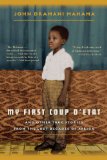Summary | Excerpt | Reading Guide | Reviews | Beyond the book | Read-Alikes | Genres & Themes | Author Bio

An Autobiography
by Paul RusesabaginaFrom the book jacket:
As his country was being torn apart by
violence during the Rwandan genocide of
1994, hotel manager Paul Rusesabagina
refused to bow to the madness that
surrounded him. Confronting killers with a
combination of diplomacy, flattery, and
deception, he offered shelter to more than
twelve hundred members of the Tutsi clan
and Hutu moderates, while homicidal mobs
raged outside with machetes. An Ordinary
Man explores what the Academy
Award-nominated film Hotel Rwanda
could not: the inner life of the man who
became one of the most prominent public
faces of that terrible conflict.
Comment: Rusesabagina relates the
full story of his life - growing up as the
son of a rural farmer and the child of a
mixed marriage (Hutu father, Tutsi mother),
and how he became the first Rwandan manager
of the Belgian-owned Hotel Milles Collines.
He then takes the reader inside his hotel
where he protected 1,268 people from almost
certain death for three terrible months
between April 6 and July 4 1994 during which time
more than 800,000 Rwandans were killed.
"You cannot understand the magnitude. Just try! Eight hundred thousand lives snuffed out in one hundred days. That’s eight thousand lives a day. More than five lives per minute. Each one of those lives was like a little world in itself. Some person who laughed and cried and ate and thought and felt and hurt just like any other person, just like you and me. A mother’s child, every one irreplaceable." - Paul Rusesabagina.
Rusesabagina expresses surprisingly little
anger in telling his story. He insists that
he is not a hero and only did what any
decent person would have done, but he is
entirely clear when expressing his contempt
for the UN peacekeepers for failing to avert what he sees as an entirely preventable disaster.
Did you know?
Of the 120,000 charged with war-crimes, to date only 5,000 have been tried in Rwandan courts, and just 17 have been convicted by a UN-appointed tribunal. The unrest has never fully ended, with fighting within the country and fighting
between Rwanda and Uganda over
the Congo. In 2003 a new
constitution was approved and
elections were held which were
marred by voting
irregularities. In 2005 the
main Hutu rebel group said they
would disarm and return
peacefully to Rwanda from the
Congo but the Rwandan government
say that those who took part in
the 1994 genocide will face
trial if they return.
Paul Rusesabagina is the recipient of
the National Civil Rights Museum’s 2005
Freedom Award; he now lives in Brussels,
Belgium. An Ordinary Man is co-authored by
Tom Zoellner, author of The Heartless Stone
![]() This review was originally published in The BookBrowse Review in June 2006, and has been updated for the
March 2007 edition.
Click here to go to this issue.
This review was originally published in The BookBrowse Review in June 2006, and has been updated for the
March 2007 edition.
Click here to go to this issue.

If you liked An Ordinary Man, try these:

by Elizabeth Weil, Clemantine Wamariya
Published 2019
A riveting story of dislocation, survival, and the power of stories to break or save us.

by John Mahama
Published 2013
My First Coup d'Etat chronicles the coming-of-age of John Dramani Mahama in Ghana during the dismal post-independence "lost decades" of Africa.
Your guide toexceptional books
BookBrowse seeks out and recommends the best in contemporary fiction and nonfiction—books that not only engage and entertain but also deepen our understanding of ourselves and the world around us.